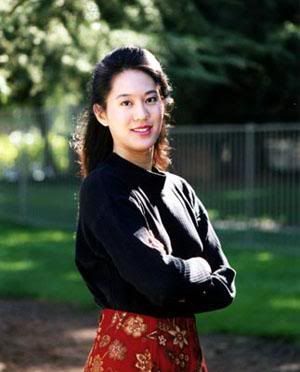已故张纯如女士

送交者: 老椰子 于 December 14, 2007 22:15:27:
我注意到,在说这句话时,李昂西斯表情严肃,眼里闪着光。我把这种光解读为出自心灵深处的诺言,是在具有共同的社会良知和历史责任感的思想基础上的大义承担。 今年是南京大屠杀70周年。12月12日,好莱坞影片《南京》在纽约首映。 《南京》是根据已故美国华裔女作家张纯如(Iris Chang,1968-2004)《南京大屠杀》的第五章《南京安全区》改编,是一部纪实性的剧情片。影片中的历史镜头全部采用真实的历史影像资料,讲述协助受害者的德国商人拉贝和美国女教士魏特林等人留下的故事,并且穿插了80多位南京大屠杀的幸存者和参与大屠杀行动的日本老兵的回忆。影片中的具名人物由演员扮演。古腾塔格(Bill Guttentag)和斯特尔曼(Dan Sturman)合作导演。《南京》是好莱坞继《辛德勒的名单》(Schindler's List)之后的又一部反思二战的重要作品。 影片投资人李昂西斯(Theodore "Ted" J. Leonsis),1957生于纽约市布鲁克林区(Brooklyn, New York),在乔治城大学(Georgetown University)毕业后,到王安公司(Wang Laboratories)上班,开始了他的成功之路。李氏曾入选《华盛顿商业杂志》(Washington Business Journal)2001年度商业人物榜,做过佛罗里达州兰花市(Orchid,Florida)的市长,创建过自家的生意红门通讯公司(Redgate Communications Corporation),目前是美国在线(AOL)的副总裁、多个专业体育团队的持股人、母校乔治城大学的校董等等。 虽然在事业上非常成功,但李昂西斯不过是许多富有的美国生意人之一。如果他不是拍了这部电影,我们绝大多数的人不会知道他是谁,更不会刻意去了解他的事迹。 2005年初,李昂西斯偶然看到张纯如的讣告,便找来她的一些书读。读过《南京大屠杀》后,他被书中所述的史实震惊。在此之前,和大多数美国人一样,对于日本人在中国以及亚洲其他国家所犯下的灭绝人性的滔天罪行,包括南京大屠杀事件,他所知甚少。李昂西斯作出了决定,他拿出资金,先后派出35名调查人员到中、日、美、德等地调查访问,掌握和了解了关于南京大屠杀的相当资料和史实之后,拍摄成电影。李昂西斯说,这部影片是基于电影胶片、日记、书信和见证者,是来自西方、中国和日本的人们的见证,不包含任何我们工作人员的杜撰。我们仅仅是让当年的目击者告诉制作人员到底发生了什么,让观众了解一段事实。 现在,他做了这件事。他用他的电影提醒人们注意一个在很大程度上被否认、隐瞒、篡改、忽略的历史事件。他用铁的事实来说明问题,来教育、警诫世人和后代,提防那些邪恶的人对人类中的其他人做出类似的犯罪。在他开始做这件事的时候,人们就知道了:李昂西斯不仅是一个有钱的人,他也是一个善良的、有正义感的人,他用他的钱做了一件有益于人类的好事。按中国的传统说法,我认为,李昂西斯是个义士,是个仁义之士。 几天前,我在电视上看到这样一幅画面:李昂西斯对观众说,我有时觉得张纯如在盯着我看。 我注意到,在说这句话时,李昂西斯表情严肃,眼里闪着光。我把这种光解读为出自心灵深处的诺言,是在具有共同的社会良知和历史责任感的思想基础上的大义承担。 李昂西斯的合作制片人是冯都(Violet Du Feng)。冯很年轻,我不了解她的背景资料。 该片还将继续上演直到圣诞节。纽约以及附近的民众请到网上查询:Film Forum,209 West Houston Street(位于Varick St 和 6th Avenue之间,乘1号地下铁Houston站下),电话:212-727-8100;亦可向纪念南京大屠杀受难同胞联合会电话查询电影票信息:718-939-0195或917-453-8726。 注意,这是个R级的电影,有些画面对儿童不宜,按美国的规定,17岁以下的孩子观看时需要大人陪同。 谨以此短文纪念南京大屠杀70周年,并向张纯如和李昂西斯等致敬!
老椰子
2007年12月13日于纽约
附图片:
已故张纯如女士
李昂西斯和冯都
附文章:《纽约时报》影评
Giving Testimony on the Horror That Was Nanking
By STEPHEN HOLDEN
"Nanking" is a swift, incisive documentary about one of the lesser-known horrors of the 20th century: the 1937 Japanese invasion of the Chinese city now called Nanjing, where more than 200,000 civilians and prisoners of war were slaughtered in a matter of weeks. The capital of the Republic of China at the start of World War II and the head uarters of the Chiang Kai-shek government, this attractive, cosmopolitan city of parks and thoroughfares was largely destroyed in what is known as the rape of Nanking.
Though some Japanese scholars dispute the statistics determined after the war by the International Military Tribunal for the Far East, it is widely agreed that during the occupation in 1937 and 1938, more than 20,000 rapes were also committed by the rampaging Japanese Army. In its concentrated savagery, the catastrophe was comparable to the even more numerous mass murders in Rwanda in 1994.
The film, directed by Bill Guttentag and Dan Sturman, has the format of a mixed-media theater piece. Interwoven with rare, vintage news clips of the city's bombing, invasion and occupation are readings by actors from journals and letters kept by the few Westerners who remained in the city during the siege. Additional grisly firsthand recollections by now elderly Chinese survivors and Japanese soldiers tell a story that has become painfully familiar in the age of information overload: a collective fever of blood lust can lead to a kind of mass insanity in which the rules of civilized behavior are suspended.
"Nanking" suggests that in a world grown jaded by images of violence, written testimony read aloud still carries a weight that the most horrifying images cannot exert. Shown sparingly in the film, the pictures of the dead and seriously injured may sear your mind, but the act of recalling the unspeakable and giving it voice creates a deeper reality.
Many of the dozen witnesses are heroic men and women from Europe and the United States who remained in the city and saved thousands of lives by setting up a two-square-mile safety zone for the many thousands of civilians unable to evacuate.
Woody Harrelson reads the words of Bob Wilson, who was born in China, the son of an American missionary. He was the only surgeon to remain in Nanjing after the Japanese began bombing the city.
Mariel Hemingway speaks for Minnie Vautrin, a Christian missionary and chairwoman of the education department at Ginling College, who saved countless women from rape by hiding them from the marauding soldiers.
Jurgen Prochnow is John Rabe, an imperious German businessman and Nazi Party member, who used his status to try to halt the violence; when Mr. Rabe, who harbored 650 Chinese civilians on his estate, eventually returned to Germany, he was ordered never to speak of what he had seen.
Hugo Armstrong is John Magee, an Episcopal minister and amateur filmmaker who set up a hospital for wounded solders. "Nanking" includes excerpts from grainy 16-millimeter film he shot of the grotes uely disfigured patients. His film was smuggled out of the country at considerable peril and only discovered in Germany in the 1980s.
Old photographs suggest that the actors were chosen because they bear some resemblance to the people they portray. They speak directly to the camera in the sober tones of witnesses at a human rights trial. Events are related more or less chronologically.
In August 1937, six years after the Japanese occupied Manchuria and established a puppet state, Japan began a full-scale invasion of China. While fighting a fierce ground war in Shanghai, Japan also began heavy airraids on Nanjing.
By the time the Japanese Army entered the walled city on Dec. 13, much of the population had fled, and only 22 Westerners remained. Mr. Wilson, Mr. Rabe and Mr. Magee were among the six people who formed a committee to establish the safety zone in the western part of the city for the remaining civilians.
Witnesses describe the awful uncertainty surrounding the zone's creation. Would the Japanese agree to its formation? After it was established, would they respect its borders? As the rest of the city was burned and looted, the safety zone was regularly breached as the Army searched for Chinese soldiers disguised as civilians. But thousands of lives were saved.
What makes the film bearable is the knowledge that a few people did what they could to hold the line against humanity's worst instincts. The voices in "Nanking" speak for the persistence of good in times and places where a moral crevice opens to reveal a vision of hell on earth.
"Nanking" is rated R (Under 17 requires accompanying parent or adult guardian). It has gory images of war and harrowing accounts of rape and mutilation.
New Yor Time, Wednesday, December 12, 2007